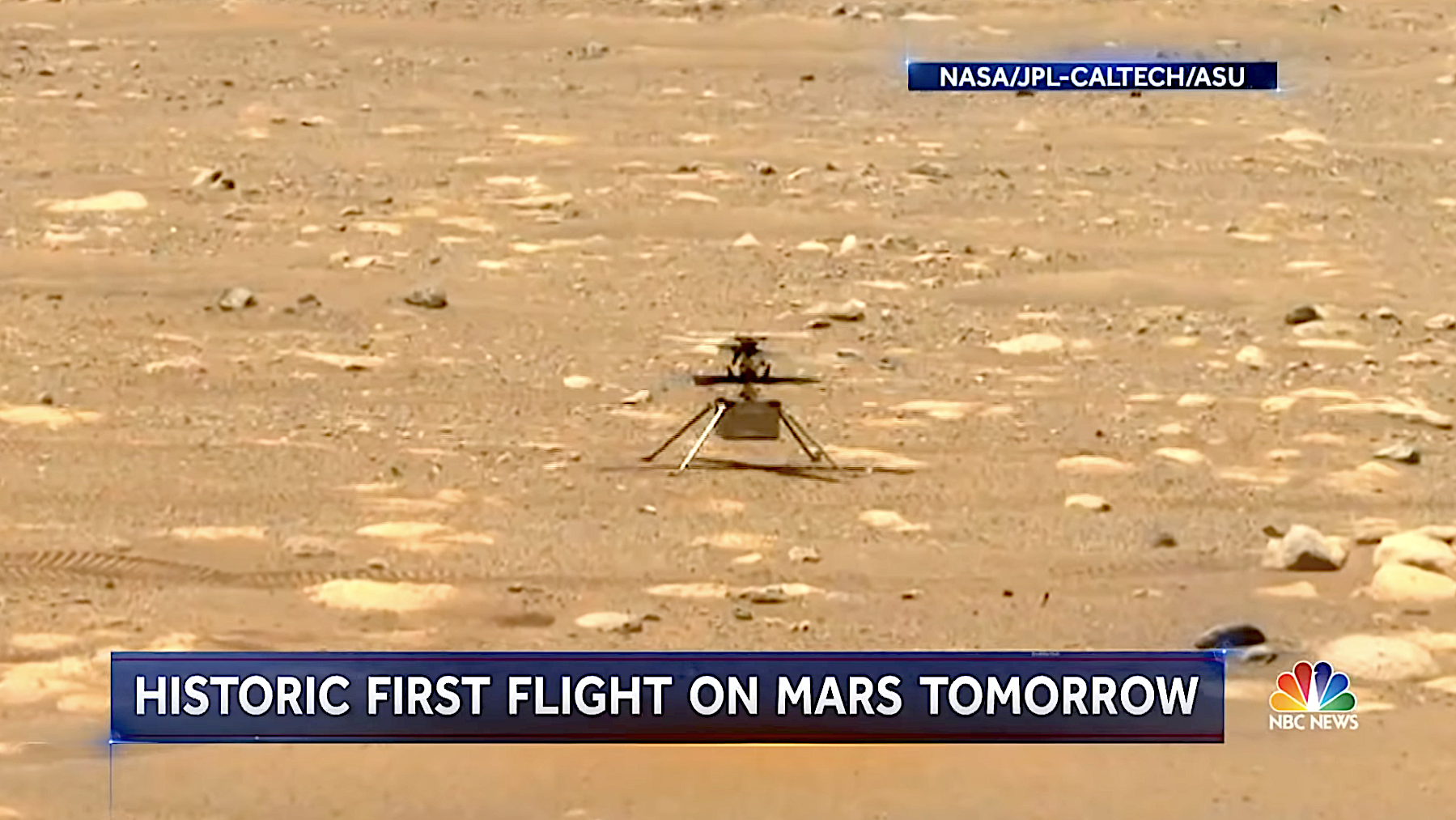Watch NASA attempt history with test flight of remote-control Mars helicopter Ingenuity


A free daily email with the biggest news stories of the day – and the best features from TheWeek.com
You are now subscribed
Your newsletter sign-up was successful
NASA will attempt to fly a remote-control helicopter on Mars early Monday, aiming for humanity's first powered, controlled flight on another planet. The solar-powered lightweight helicopter, Ingenuity, hitched a ride to Mars on the belly of the Perseverance rover, which will help Ingenuity communicate with mission control and also record the test flight from about 330 feet away. NASA will try to get Ingenuity to rise to about 10 feet above the Martian surface, hover for about 20 seconds, then land back at its airfield in Jerezo Crater.

Ingenuity is the product of six years of work at NASA's Jet Propulsion Laboratory in California. This will be the second attempt to get it in the air, after a "watchdog" timer glitch forced NASA to call off an April 11 test flight. NASA successfully tested the rotors on Friday, and it has a plan and a backup plan for Monday's flight, wrote MiMi Aung, Ingenuity project manager at JPL. If Plan A doesn't work, Perseverance will send Ingenuity an update for its flight control software, putting off the test flight for several more days.
"Our team considers Monday's attempted first flight like a rocket launch: We're doing everything we can to make it a success, but we also know that we may have to scrub and try again," Aung wrote in an April 17 post. "In engineering, there is always uncertainty, but this is what makes working on advanced technology so exciting and rewarding. We have to continually innovate and develop solutions to new challenges. And we get to try things others have only dreamed of."
The Week
Escape your echo chamber. Get the facts behind the news, plus analysis from multiple perspectives.

Sign up for The Week's Free Newsletters
From our morning news briefing to a weekly Good News Newsletter, get the best of The Week delivered directly to your inbox.
From our morning news briefing to a weekly Good News Newsletter, get the best of The Week delivered directly to your inbox.
The test flight will commence at about 3:30 a.m. EDT, but the data and images won't reach Earth for another few hours. NASA's JPL will broadcast the flight starting at 6:15 a.m. EDT, and you can watch the livestream below. Peter Weber

A free daily email with the biggest news stories of the day – and the best features from TheWeek.com
Peter has worked as a news and culture writer and editor at The Week since the site's launch in 2008. He covers politics, world affairs, religion and cultural currents. His journalism career began as a copy editor at a financial newswire and has included editorial positions at The New York Times Magazine, Facts on File, and Oregon State University.
-
 How Democrats are turning DOJ lemons into partisan lemonade
How Democrats are turning DOJ lemons into partisan lemonadeTODAY’S BIG QUESTION As the Trump administration continues to try — and fail — at indicting its political enemies, Democratic lawmakers have begun seizing the moment for themselves
-
 ICE’s new targets post-Minnesota retreat
ICE’s new targets post-Minnesota retreatIn the Spotlight Several cities are reportedly on ICE’s list for immigration crackdowns
-
 ‘Those rights don’t exist to protect criminals’
‘Those rights don’t exist to protect criminals’Instant Opinion Opinion, comment and editorials of the day
-
 ABC News to pay $15M in Trump defamation suit
ABC News to pay $15M in Trump defamation suitSpeed Read The lawsuit stemmed from George Stephanopoulos' on-air assertion that Trump was found liable for raping writer E. Jean Carroll
-
 Judge blocks Louisiana 10 Commandments law
Judge blocks Louisiana 10 Commandments lawSpeed Read U.S. District Judge John deGravelles ruled that a law ordering schools to display the Ten Commandments in classrooms was unconstitutional
-
 ATF finalizes rule to close 'gun show loophole'
ATF finalizes rule to close 'gun show loophole'Speed Read Biden moves to expand background checks for gun buyers
-
 Hong Kong passes tough new security law
Hong Kong passes tough new security lawSpeed Read It will allow the government to further suppress all forms of dissent
-
 France enshrines abortion rights in constitution
France enshrines abortion rights in constitutionspeed read It became the first country to make abortion a constitutional right
-
 Texas executes man despite contested evidence
Texas executes man despite contested evidenceSpeed Read Texas rejected calls for a rehearing of Ivan Cantu's case amid recanted testimony and allegations of suppressed exculpatory evidence
-
 Supreme Court wary of state social media regulations
Supreme Court wary of state social media regulationsSpeed Read A majority of justices appeared skeptical that Texas and Florida were lawfully protecting the free speech rights of users
-
 Greece legalizes same-sex marriage
Greece legalizes same-sex marriageSpeed Read Greece becomes the first Orthodox Christian country to enshrine marriage equality in law
